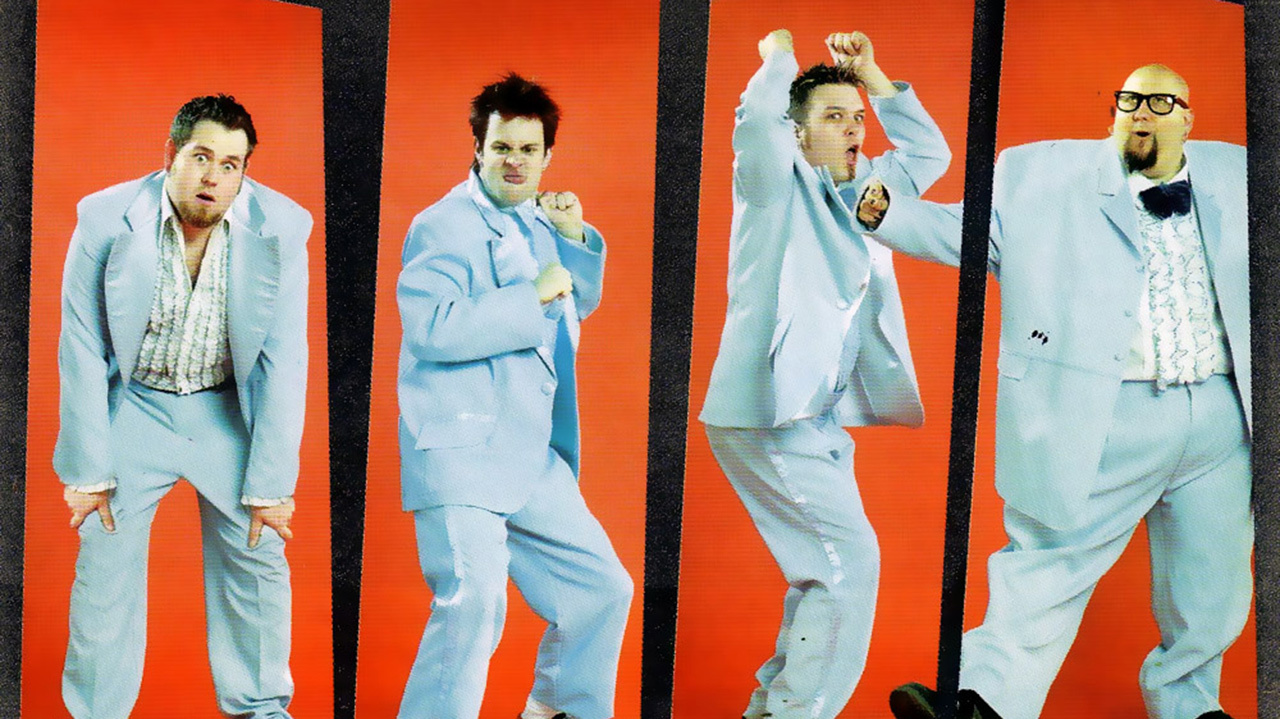Bowling For Soup: How we made Drunk Enough To Dance
We chat with Bowling For Soup co-founder and frontman Jaret Reddick to get the inside story of how they made Drunk Enough To Dance - the album which made them megastars

2002 was a massive year for pop culture. It was the year Britney and Justin called it a day for good, Michael Jackson got caught dangling his baby off a balcony, and we all saw a different side to the Prince Of Darkness when The Osbournes made its debut on MTV. It was also the year Bowling For Soup released the album that would change their lives forever.
With the release of fourth studio album Drunk Enough To Dance, Texas pop-punkers Bowling For Soup unleashed a stealth hit machine which would eventually provide the band with three massive singles and a surprise Grammy nomination. But as the band geared up for its release, they found themselves in an increasingly precarious position. So precarious, in fact, that DETD almost never happened.
“It was a weird time for us,” Jaret Reddick tells TeamRock from his home in Texas. “In the UK, we were doing well – we did a couple of tours over there, we got to play Reading and Leeds Festival. The Bitch Song [the lead single from previous album Let’s Do It For Johnny] had done really, really well.”
“But to be honest, in the US, it was very, very hit or miss. Sometimes there were literally three people at shows. We were coming off of a time where if it weren’t for the UK ‘getting’ The Bitch Song, I don’t know that we even would have been able to make Drunk Enough To Dance.”
“The band itself was pretty dire, we weren’t making any money,” he continues. “We had thought ‘Oh man, we’ll get signed by a record label and everything’s going to be awesome,’ and it actually got worse. Now rather than just playing in Texas – which is so huge we could play here for 10 or 12 shows, make a bunch of money and spend that travelling round everywhere else – now the label was wanting us spread thin, doing radio shows [all over the place]. We weren’t getting any tour support, so we did it all on our own. Frankly, I’m glad we did. It made us really, really strong.”
The label Reddick is referencing here was Jive, a label who, when BFS joined, were facing their own period of upheaval. “When we signed with Jive they were the largest independent label in the world,” Reddick explains. “They were owned by one guy – his name’s Clive Calder – he ended up selling the label for 4 billion dollars, he bought an island and nobody ever heard of him again.”
“We had already made the record [and] it was getting into the release of it when the label sold, so it was a scary time because there was lot of unknowns. Like, ‘Oh shit, the label’s going to become this huge big thing now, and we’re not just the low man on the totem pole – we’re not even on the pole yet. We’re as low as low can be, we’ve made them no money, we have no traction at all’.”
The latest news, features and interviews direct to your inbox, from the global home of alternative music.
“It was good going in,” he concludes, “but complicated, I guess.”
While DETD was technically their fourth studio album, it was, in fact, the first album they’d got together to write and record from scratch. “There was some pressure there,” admits Reddick. “I’d never really even thought about writing a hit before, but I didn’t know how to write a hit yet, so it was also this unchartered territory of just like – fuck it, I’m going to write cool songs, as many of them as I can, and then we’ll just see what happens. It was a nice feeling of youth and no pressure and no rules. Over the years, all of that changes whether or not you have a hit or not.”
When the time to record the album came, the band, for the first time ever, called upon outside help. Enter Marvelous 3 frontman Butch Walker. “I was excited about that because I loved Marvelous 3,” says Reddick. “The actual recording process, Butch always made it fun. The pattern we got into with him we actually still carry on to this day, and that is you go [to the studio], you record, you can start having some beers or some wine or whatever around five, and then after around 10 or 11, that’s when you record all the fucked up shit. So all the Ohio (Reprise) that happens on Hangover You Don’t Deserve, that’s when that kind of stuff happens.”
Despite the “dire situation” the band were in, Reddick looks back on the recording process fondly. “I think probably if I’m going favourite memory of writing and recording [it was] just getting to Atlanta, checking into our hotels – we had never done anything like that before. Everything we’d always done was at home – we’d leave the studio, go home, then you’d go record again when you had some money. We had these two apartments for a month and it was like, ‘We’re going to camp, guys! This is great!’”
“We rented a van, so every day we went to the studio, we recorded songs, we went back to [the apartments], we drank beer, we talked, had fun, threw shit off the side of the building and it was great. It really was awesome. None of us had kids at that point, and it just wasn’t a lot of responsibility. We didn’t have any money, we went to the studio and went back to the hotel, [and] it was a pretty fantastic time.”
- The 10 best pop punk albums, as chosen by ROAM
- Our TeamRock+ offer just got bigger. And louder.
- How Green Day's Basket Case changed pop-punk forever
- 10 Songs I Wish I'd Written, by Bowling For Soup's Jaret Reddick
With the album written and recorded, it was time for release. The album, predictably, took off in the UK. Equally as predictably, in the US, it flopped. “People got it right off in the UK,” says Reddick. “You have to understand, again, we were sort of living two separate existences. In the UK we were going over there and Girl All The Bad Guys Want hit like crazy, so the next thing we know we’re headliners. But [in the US], we’re still really, really fighting.”
This is where the tide begins to change, all thanks to a small pop radio station in Indiana. “[The album came out and it was six or eight months later, and things are looking a little dire,” explains Reddick. “We had gone to rock radio – radio works a little differently in our country – and it just didn’t do that well. Well, long story short, a radio station in Indiana put Girl All The Bad Guys Want in power-rotation, and it was a pop station. Turn of the year happens, 2003, the song gets nominated for a Grammy, and then the whirlwind starts. From that point on it was four or five years of insanity, and that’s pretty much the day that it all started.”
With that one Grammy nomination, the world began to open up to BFS. “It was the weirdest thing in the world,” says Reddick. “It was kind of unbelievable – we’d had little things happen, like we’d gotten a Billboard Video Award, little wins along the way, and for us that was fine; it was just a matter of staying afloat and staying a band and doing what we did and really just surviving.”
“But [this] changed a lot of things. There was a lot of validation that happened with that Grammy nomination. It’s like we got a degree or something, because we’ll never not be Grammy-nominated. It’s literally 15 years ago, but we’re still the Grammy-nominated Bowling For Soup and we’ll have that forever. I love that thing, too, because you don’t even have to win. We probably got fifth place out of five, but we still get to tag that onto our band name any time we want.”
The one obvious awkward thing that sticks out about this Grammy nomination is the category in which it fell – best pop performance. While pop radio had saved their careers, it had all but shattered their chances of being accepted as a credible rock act in the US. “In the US, once you go a pop way, you can’t go back,” admits Reddick. “Simple Plan and All American Rejects and Bowling For Soup, we all got played on pop stations so now we couldn’t be played on the rock stations anymore. But it was interesting because we were sort of the bad boys of the whole thing. People kind of treated us as like ‘Ooh, that’s the rock band that’s on today’, or whatever, whereas at that time, had we tried to go on Warped Tour or whatever, it would’ve been the exact opposite, because we’d have been the pop band that was trying to find its way into punk.”
But, eventually – and this is maybe one of the things that has marked BFS out from their early 2000s contemporaries, and given them the longevity they still enjoy – they did manage to break their way back into the rock world. Or, more specifically, that Warped Tour punk world. “After the first year or so of all of this going on, we did jump on Warped Tour,” says Reddick. “What was really cool for us is [that] we definitely had a badge around our neck going in, like ‘Oh, it’s the guys with the pop hit’, but we earned our way through it the first year, we muscled it out. We played the smallest stage, had huge crowds, sold the most merch almost every day, and we worked hard. So we earned the respect of the Warped Tour bands, and now, we’re considered a Warped Tour band. We did it.”
“You have to show that you deserve to be there,” says Reddick. “And I think that just took us walking in the room and showing everybody that we’re the nicest people on the planet.”
So, 15 years on, the band have released a mind-bending 17 studio albums in total. They’ve changed, developed and grown, both as a band and as responsibility-bearing adults. Is there anything they miss from that carefree time when they stood on the cusp of making it? “There were definitely a lot less worries,” says Reddick. “It was pre-kids, pre-mortgages and there were a lot more reasons to be gone than to be home back then. Life obviously gets more challenging – I have three kids and three dogs and my wife’s my best friend; I don’t like to be gone, but I need to be gone because that’s what I do. We [used to get] in that van and most the time we didn’t know when we were coming home, and it really didn’t matter at the time.”
“Just the carefree aspect of all of it,” he continues. “Standing up on stage and not having the pressure to play hits, and it was a challenge because we had to win every single audience. Now it’s like, if you come to see Bowling For Soup and you don’t like one song, the next song is something that you grew up listening to, so we don’t really have that whole challenge as much anymore.”
“Which is nice, believe me” he suddenly adds with a chuckle. “It’s nice to go to work and just be able to do your best and put on a great show and not have to win over every single person, but that’s what made us who we are.”
We’ll drink to that.
Bowling For Soup will be touring Drunk Enough To Dance in full as part of their Get Happy Tour 2018 which hits the UK next February - head to their official site for full dates.
5 Things I Can't Live Without: Erik Chandler, Bowling For Soup
Bowling For Soup on high school, Neil Young and getting angry
The best pop punk cover versions, as chosen by Between You And Me
Briony is the Editor in Chief of Louder and is in charge of sorting out who and what you see covered on the site. She started working with Metal Hammer, Classic Rock and Prog magazines back in 2015 and has been writing about music and entertainment in many guises since 2009. Her favourite-ever interviewee is either Billy Corgan or Kim Deal. She is a big fan of cats, Husker Du and pizza.

